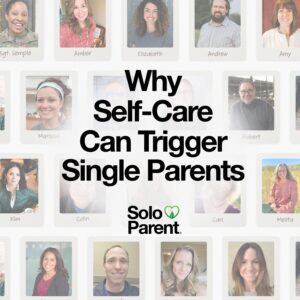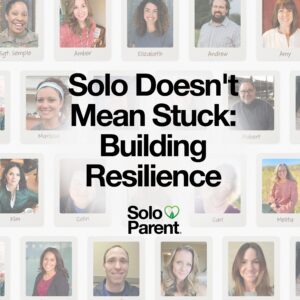Some seasons of solo parenting feel like you’re stuck at the bottom of a mountain with no way up. The responsibilities, the grief, the exhaustion, it can all pile so high that even simple joys feel out of reach. In those moments, it’s easy to believe that life will never be more than just surviving.
But survival isn’t the end of the story. There are ways to begin rediscovering joy and building rhythms that give strength for the journey. In this week’s episode, we talk with Will Acuff, co-founder of Corner to Corner and author of No Elevator to Everest, who shares how despair led him into deeper self-awareness and daily practices that truly brought him back to life. His story reminds us that healing doesn’t come in giant leaps. It comes in small, intentional steps.
Key Insights from This Episode
- Naming what’s hard opens the door to healing.
- Daily practices create space for peace and clarity.
- Reframing sacrifice changes everything.
Naming what’s hard opens the door to healing.
When pain feels unending, it’s tempting to fake strength. We quote platitudes, keep moving, and try to convince ourselves we’re fine. But that strategy often leaves us lonelier and more exhausted.
Will described reaching his breaking point: “I had tried everything I knew how to do to solve what my son was experiencing… and nothing was happening. My wife was struggling with depression, my son had diagnoses we couldn’t untangle, and I felt like every day was a little worse than the one before.”
Many solo parents know that feeling well. It’s the moment when you realize you can’t fix your kids, your family, or yourself by sheer effort. That realization isn’t weakness. It’s honesty.
Grieving doesn’t make you fragile, it makes you human. Lament creates space for hope to return. Instead of numbing out or recycling complaints, we can acknowledge the pain for what it is and allow it to be released.
Daily practices create space for peace and clarity.
Life doesn’t always calm down. Kids still need care, bills still need paying, and emotions still rise. That’s why small, intentional rhythms matter. They don’t erase chaos, but they prepare you to meet it differently.
Will shared his practice of beginning each morning with what he calls an “emotional trailhead.” He starts with simple breathwork, four counts in, four counts out, to calm his body and clear his thoughts. Then he names whatever emotion feels strongest. “You don’t wake up neutral,” he explained. “You’re already churning on things. That big emotion is the trailhead. If I follow it with curiosity instead of ignoring it, I usually discover what’s really going on.”
Whether it’s journaling, breathwork, or a walk in the morning, these rhythms give you back your agency. They remind you that while you can’t control everything, you can design a healthier way to show up.
Over time, these practices shape how you respond in real-time moments with your children. Will recalled a day when his son shattered a car windshield in anger. The old version of himself would have exploded. Instead, because of the groundwork he’d been doing, he was able to breathe, stay calm, and help his son de-escalate. That kind of presence doesn’t happen by accident. It’s cultivated.
Reframing sacrifice changes everything.
Sacrifice is built into single parenting. You give up sleep, comfort, financial freedom, and so much more for your kids. But sacrifice can easily feel like an endless drain—one that leaves you bitter and burned out.
Will offered a different perspective: “Don’t waste the sacrifice. If you’re sacrificing out of emptiness, it’s not what it could be. What your kids really need is a full connection with you. So connect with yourself first, then give out of that.”
Instead of seeing it as one more thing you endure, you can approach it with curiosity: How might this become joyful? How can I shift this daily demand so it doesn’t deplete me? Sometimes it’s as simple as reframing a routine or finding small sparks of joy within it.
When sacrifice flows from fullness instead of emptiness, it becomes meaningful, not just for you, but for your kids too.
At its heart, this episode is about moving from despair to hope, from surviving to thriving. Will’s story is proof that even in the hardest seasons, there are practices and perspectives that can help you reclaim peace, connection, and joy.
Listener Question
“How can I reframe hard circumstances without just pretending everything’s fine?”
Will’s response: “Name what’s hard. Write it down. Allow yourself to lament instead of recycling sadness every day. And then, step forward anyway. Acceptance doesn’t mean minimizing the pain, it means being honest about it and still choosing life.”
Elizabeth added, “I don’t do a good job of grieving even the little things. But what I hear you saying is that everything is worth grieving if it brings you sorrow.”
Resources Mentioned In This Episode:
- No Elevator to Everest by Will Acuff: A resource offering spiritual practices and perspectives that integrate emotional health, self-awareness, and a deeper connection with God’s heart.
- Corner to Corner: Nashville nonprofit (co-founded by Will Acuff) helping entrepreneurs launch from historically low-income communities
We want to answer any Solo Parent questions you may have. Submit your listener questions HERE.
Additional Resources:



